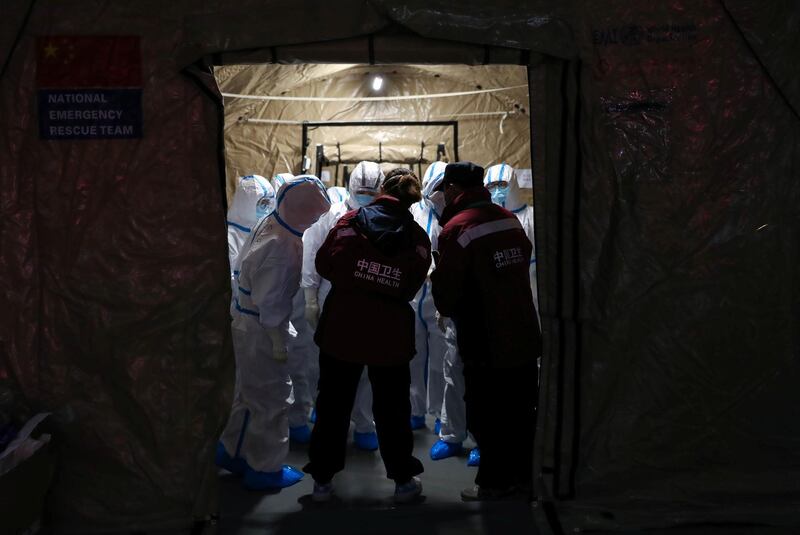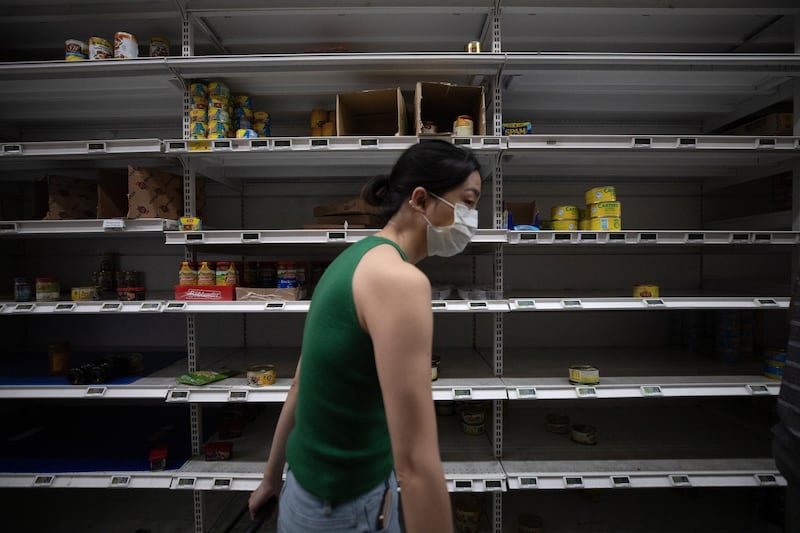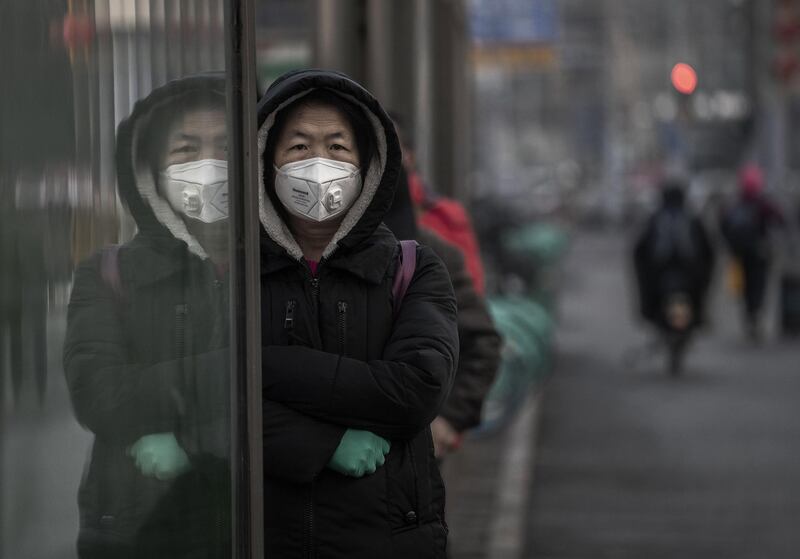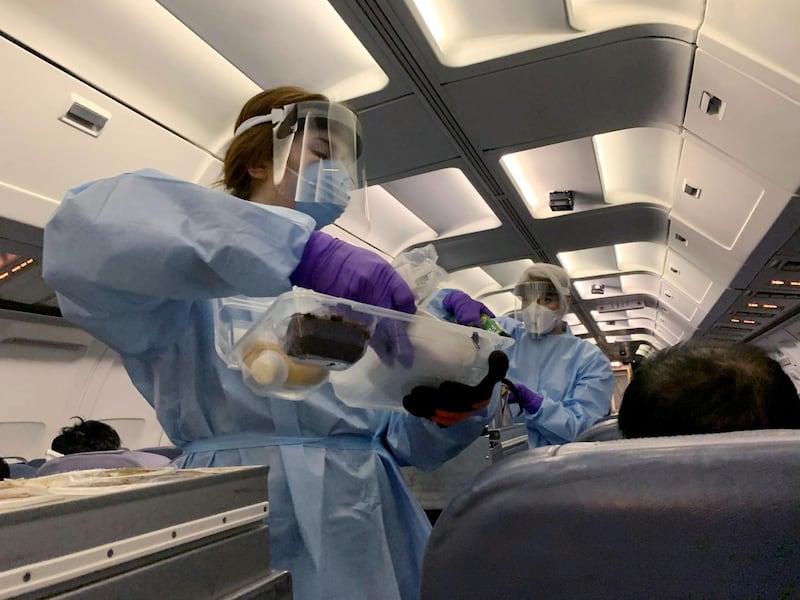Coronavirus cases continue to surge in China and new infections are being reported worldwide.
There have been 37,594 confirmed cases and 814 deaths from the virus outbreak as of February 9, according to official figures.
The toll has exceeded the 774 killed worldwide during the 2002-2003 Sars epidemic, making it a deadlier disease.
The growth in the number of cases reported has slowed down in the past days but experts said the spread is still a concern.
The number of infections continue to rise despite lockdowns in China and restricted air travel to the worst affected areas.
Scientists are now trying to find drugs and vaccines that could help bring the virus under control but several questions remain unanswered. Why is the virus so infectious? Can I protect myself from getting exposed? Can people become infected through their eyes?
Scientists say the answer lies in the way the virus operates. The National explains the science behind it.
Is coronavirus the most contagious?
It is certainly not the most infectious virus we know of. That title can be claimed by measles, which infects 90 per cent of people without immunity.
Studies use a value called R-nought (R0) to rate a disease’s infectiousness, which suggests how many people one patient will go on to infect.
Measles has an R0 value of 12-18, meaning one person can pass it to 12 to 18 others.
A study published in the New England Journal of Medicine in late January suggested the R0 value of the new coronavirus to be 2.2.
That is higher than seasonal flu, which is said to have an R0 of 1.3.
A disease which has a R0 value of less than one will eventually peter out and die.
What do studies say?
One study published in the journal Jama last week suggested coronavirus may be far more infectious than the R0 value of 2.2 suggests.
According to the findings, which is said to be one of the most comprehensive to date into the virus, just one patient went on to infect at least 10 health care workers and four other patients in a hospital in Wuhan, the epicentre of the outbreak.
Why are people susceptible to infection?
That is primarily due to two reasons, believe doctors.
“Because it is extremely novel, which means it is absolutely new to the human race,” said Dr Ram Shukla, specialist in Internal Medicine at Al Zahra Hospital.
“We don’t have immunity at all.”
Secondly, the virus could be spread by people with no symptoms.
One study of a case in Germany seemed to suggest it was spread during the incubation period, but it was later found to be flawed.
Yet many doctors believe transmission still occurs in asymptomatic patients.
A new estimate by Japanese researchers says at least one in every two transmissions of the infection are believed to occur while the first patient is asymptomatic.
This makes it extremely difficult to contain the virus, even in countries with strict infection control procedures.
How does it spread?
By droplets from coughs or sneezing – although sneezing appears to be less common, according to a study. Since a cough is one of the main symptoms, it is safe to assume this is primarily how it is spread. Cough droplets tend to be heavier, so do not spread as far as sneezes, instead falling nearby and down on to surfaces
According to a Harvard Medical School blog, coronaviruses are usually spread through droplets containing large particles that typically “can only be suspended in the air three to six feet before dissipating”.
Viruses like measles and chickenpox spread further because the droplets are smaller.
This is why passengers aboard some cruise ships, who have been quarantined, are allowed out to exercise on the deck but must not get close to others.
Doctors and scientists are still unsure about how the virus spreads.
Dr Maisaa Al Sulaiman, family medicine at Burjeel Speciality Hospital in Sharjah, said studies have shown it can be transmitted from person-to-person.
“However, it is not known how the virus was transmitted in all these cases, whether it was by breathing (such as coughing and sneezing) or contact (contaminating the patient with the environment).”
Are face masks effective?
Masks are not recommended by the United States Centres for Disease Control.
A regular face mask does not offer any kind of protection.
A more specialised N95 respirator does filter out germs from the air we breathe but doctors say they are uncomfortable and difficult to wear as they have to fit tightly on to the face.
Can people become infected through their eyes?
Possibly, yes.
One letter published in The Lancet medical journal suggested a doctor may have contracted the virus through the eyes.
The paper, written by ophthalmologists, explored the case of Guangfa Wang, a Chinese expert who came down with the virus after saying it was controllable. Several days before the onset of pneumonia, Mr Guangfa complained of redness of the eyes.
“He wore an N95 mask but did not wear anything to protect his eyes. Several days before the onset of pneumonia, Wang complained of redness of the eyes. Unprotected exposure of the eyes to 2019-nCoV in the Wuhan Fever Clinic might have allowed the virus to infect the body,” the study read.
Li Wenliang, the ophthalmologist who tried to warn colleagues about the virus who has since died, was well aware of its dangers but still contracted the disease after operating on an infected patient.
How to protect yourself against coronavirus

The best way to protect ourselves
Doctors recommend washing your hands regularly and avoid touching your face as much as possible. You are more likely to infect yourself by touching a contaminated person or surface and then spreading the germs to your mouth or eyes.
People should not panic as that can lower the immunity level in a person.
“When someone is in a panic mode, the immune system is suppressed, which makes you more vulnerable to infection,” said Dr Shukla.
“It is good to have all the information and know the precautions to take, but getting fearful and scared will make you more vulnerable,” he said.




















